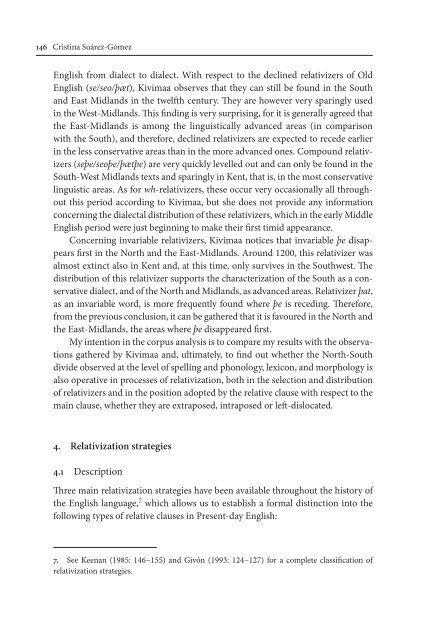Selected Papers from the Fourteenth International ... - STIBA Malang
Selected Papers from the Fourteenth International ... - STIBA Malang
Selected Papers from the Fourteenth International ... - STIBA Malang
You also want an ePaper? Increase the reach of your titles
YUMPU automatically turns print PDFs into web optimized ePapers that Google loves.
146 Cristina Suárez-Gómez<br />
English <strong>from</strong> dialect to dialect. With respect to <strong>the</strong> declined relativizers of Old<br />
English (se/seo/þæt), Kivimaa observes that <strong>the</strong>y can still be found in <strong>the</strong> South<br />
and East Midlands in <strong>the</strong> twelfth century. They are however very sparingly used<br />
in <strong>the</strong> West-Midlands. This finding is very surprising, for it is generally agreed that<br />
<strong>the</strong> East-Midlands is among <strong>the</strong> linguistically advanced areas (in comparison<br />
with <strong>the</strong> South), and <strong>the</strong>refore, declined relativizers are expected to recede earlier<br />
in <strong>the</strong> less conservative areas than in <strong>the</strong> more advanced ones. Compound relativizers<br />
(seþe/seoþe/þætþe) are very quickly levelled out and can only be found in <strong>the</strong><br />
South-West Midlands texts and sparingly in Kent, that is, in <strong>the</strong> most conservative<br />
linguistic areas. As for wh-relativizers, <strong>the</strong>se occur very occasionally all throughout<br />
this period according to Kivimaa, but she does not provide any information<br />
concerning <strong>the</strong> dialectal distribution of <strong>the</strong>se relativizers, which in <strong>the</strong> early Middle<br />
English period were just beginning to make <strong>the</strong>ir first timid appearance.<br />
Concerning invariable relativizers, Kivimaa notices that invariable þe disappears<br />
first in <strong>the</strong> North and <strong>the</strong> East-Midlands. Around 1200, this relativizer was<br />
almost extinct also in Kent and, at this time, only survives in <strong>the</strong> Southwest. The<br />
distribution of this relativizer supports <strong>the</strong> characterization of <strong>the</strong> South as a conservative<br />
dialect, and of <strong>the</strong> North and Midlands, as advanced areas. Relativizer þat,<br />
as an invariable word, is more frequently found where þe is receding. Therefore,<br />
<strong>from</strong> <strong>the</strong> previous conclusion, it can be ga<strong>the</strong>red that it is favoured in <strong>the</strong> North and<br />
<strong>the</strong> East-Midlands, <strong>the</strong> areas where þe disappeared first.<br />
My intention in <strong>the</strong> corpus analysis is to compare my results with <strong>the</strong> observations<br />
ga<strong>the</strong>red by Kivimaa and, ultimately, to find out whe<strong>the</strong>r <strong>the</strong> North-South<br />
divide observed at <strong>the</strong> level of spelling and phonology, lexicon, and morphology is<br />
also operative in processes of relativization, both in <strong>the</strong> selection and distribution<br />
of relativizers and in <strong>the</strong> position adopted by <strong>the</strong> relative clause with respect to <strong>the</strong><br />
main clause, whe<strong>the</strong>r <strong>the</strong>y are extraposed, intraposed or left-dislocated.<br />
4. Relativization strategies<br />
4.1 Description<br />
Three main relativization strategies have been available throughout <strong>the</strong> history of<br />
<strong>the</strong> English language, 7 which allows us to establish a formal distinction into <strong>the</strong><br />
following types of relative clauses in Present-day English:<br />
7. See Keenan (1985: 146 –155) and Givón (1993: 124 –127) for a complete classification of<br />
relativization strategies.










